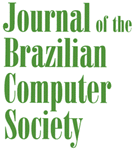Abstract
We consider the inference problem for finite transducers using different kinds of samples (positive and negative samples, positive samples only, and structural samples). Given pairs of input and output words, our task is to infer the finite transducer consistent with the given pairs. We show that this problem can be solved in certain special cases by using known results on the inference problem for linear languages.
Formal languages; inductive inference; finite transducers; linear languages
Full text available only in PDF format
Inferring finite transducers
Erkki Mäkinen
Dept. of Computer Sciences, P.O. Box 607, FIN-33014 University of Tampere, Finland, e-mail: em@cs.uta.fi
ABSTRACT
We consider the inference problem for finite transducers using different kinds of samples (positive and negative samples, positive samples only, and structural samples). Given pairs of input and output words, our task is to infer the finite transducer consistent with the given pairs. We show that this problem can be solved in certain special cases by using known results on the inference problem for linear languages.
Keywords: Formal languages, inductive inference, finite transducers, linear languages.
- [1] A.V. Aho, and J.D. Ullman. The Theory of Parsing, Translation, and Compiling. Volume I: Parsing. Prentice-Hall, 1972.
- [2] D. Angluinand C.H. Smith. Inductive inference: theory and methods. ACM Comput. Surv., 15:237-269,1983.
- [3] J. Berstel. Transductions and Context-Free Languages. B.G. Teubner, 1979.
- [4] E.M. Gold. Language identicationinthe limit. Inform. Contr., 10:447-474,1967.
- [5] M.A. Harrison, Introduction to Formal Language Theory. Addison-Wesley, 1978.
- [6] T. Koshiba, E. Makinen, and Y. Takada. Learning deterministic even linear languages from positive examples. Theoret. Comput. Sci., 185:63-79,1997.
- [7] E. Makinen. A note on the grammatical inference problem for even linear languages. Fundam. Inf., 25:175-181,1996.
- [8] J. Oncina, P. Garcia, and E. Vidal. Learning subsequential transducers for pattern recognition interpretation tasks. IEEE Trans. Pattern. Anal. Machine Intelligence, PAMI-15:448 - 458,1993.
- [9] A.L. Rosenberg. A machine realization of the linear context-free languages. Inform. Contr., 10:175 -188, 1967.
- [10] A. Salomaa. Formal Languages. Academic Press, 1973.
- [11] Y. Sakakibara. Ecient learning of context-free grammars from positive structural examples. Inform. Comput., 97:23-60,1992.
- [12] J.M. Sempere, and G. Nagaraja. Learning a subclass of linear languages from positive structural information. Lecture Notes in Computer Science, 1433:162,174,1998.
- [13] Y. Takada. Grammatical inference for even linear languages based on controls ets. Inform. Process. Lett., 28:193-199,1988.
Publication Dates
-
Publication in this collection
14 Sept 2004 -
Date of issue
Nov 2003

